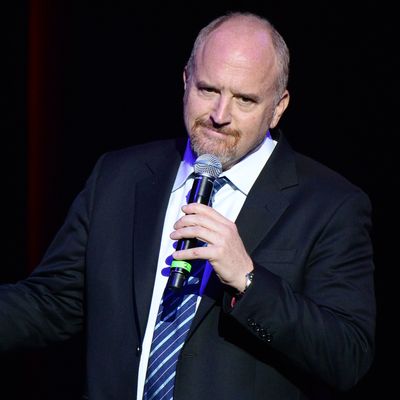
At the Comedy Cellar in Greenwich Village, there’s a table where the comics sit. It’s where they joke, debate, goof off, and ridicule their friends. As depicted on the FX series Louie, it’s the most fun place to be with the smartest, coolest comics in America. Every club has one, but the Comedy Cellar is the best club, and the table Louis C.K. sat at was the best table, occupied by the likes of Chris Rock, Jerry Seinfeld, and Marc Maron. That table is the most important force in comedy. There are rarely women or gay men at that table. There are never trans people.*
I’m a cisgender man, thus not someone who has had to deal with sexual harassment of the sort Louis doled out to his colleagues. But I am a gay man, so I understand very well the kind of culture that harassment helps enforce, and which is perpetuated by that culture.
Here’s a New Yorker article from a few months ago about the table. It lists 17 comedians, including, of course, Louis C.K. Only three are women, they are confined to a single line of the article. None are gay men. The article defines the table as sanctified space, reserved only for the realest comics, and discusses their hostility to even minor changes to the table. The article describes how these comedy icons “defended the table against comedians who didn’t do standup at the Cellar, were hacks, or were dressed badly.” People who weren’t like them didn’t get to be part of the club. I am not like them. Louis’s victims were not like them.
That boys’ club is the only real structure that exists in stand-up. The patronage and mentorship that good comics receive from more established male comics is how they get stage time, representation, and jobs. Improvisers and actors have schools and casting workshops to help them build skills and connections, but for a stand-up, you’re always just waiting for one of the guys — and it is always a guy — to pay attention and help you out. If you’re not part of their club, you learn that such mentorship rarely comes your way, and when it does, it often has a cost.
Sexual harassment is one of many tools heterosexual men use to remind other comics that our status is provisional. We’re not equals. We’re not colleagues. We’re flavors, we’re different, we’re people who should quietly accept whatever creepiness is presented to us. Mostly, these tools remind us that our status as real comics is provisional. We understand that if we question the rules of the table, if we say there aren’t enough women getting stage time, or that maybe they shouldn’t use that word, or even just that Kesha is more talented than Springsteen, we’ll be expelled.
Louis, of course, sexually harassed numerous comics. He was not expelled. When managers, club owners, and comics became aware that he was assaulting comics, they did not say, “Hey, let’s figure out what’s going on,” or “He might be a threat to the other comics.” They protected him. They made the problem go away. They kicked Megan Beth Koester out of the Montreal Just for Laughs festival.
That’s because Louis’s behavior didn’t hurt the system. It maintained the system. It alienated women from careers in comedy and allowed everyone to continue to live in a world where they could believe that the table, the Official Council of American Funny, was a place only straight men were worthy of reaching. Louis C.K. once said during a Daily Show appearance, “Comedians and feminists … are natural enemies.” The table doesn’t have any space for comedians who are feminists.
I’m scared to write this, because I know the people who sit at the table will see it and say I’m not a real comic, and I don’t value real comedy. Writing this means I never get to sit at the table. At the beginning of my career when I was invited into some lesser comedy boys’ club, I did my best to play by their rules. I kept silent as they denigrated women, or explained to me how I wasn’t like the other gays. It never earned me real respect from anyone, least of all myself. My silence simply empowered a system to treat me and many other people like we were negligible and disposable.
In more recent years, I’ve questioned the established rules of comedy, particularly as they relate to discussion and participation by gay comics. Once I did a TV segment mocking the homophobia of a Comedy Central show. A famous, respected, politically liberal comic unbooked me from his show because he didn’t think comics should criticize other comics in public. He never considered that when the Comedy Central show in question was incessantly ridiculing homosexuality with no gay comics present, they were criticizing those comics. They were criticizing me.
So that’s why I’m writing this, so I no longer have the option of sitting at that table. We don’t need a female comic with provisional status at the table. We don’t need the table to find the trans comic who’s least offensive to them and kind of learn his name. It will still perpetuate a system that privileges and protects the perspective of straight cis men. The table is the problem. Burn the table down.
* The article previously stated there were never gay men at the table.

